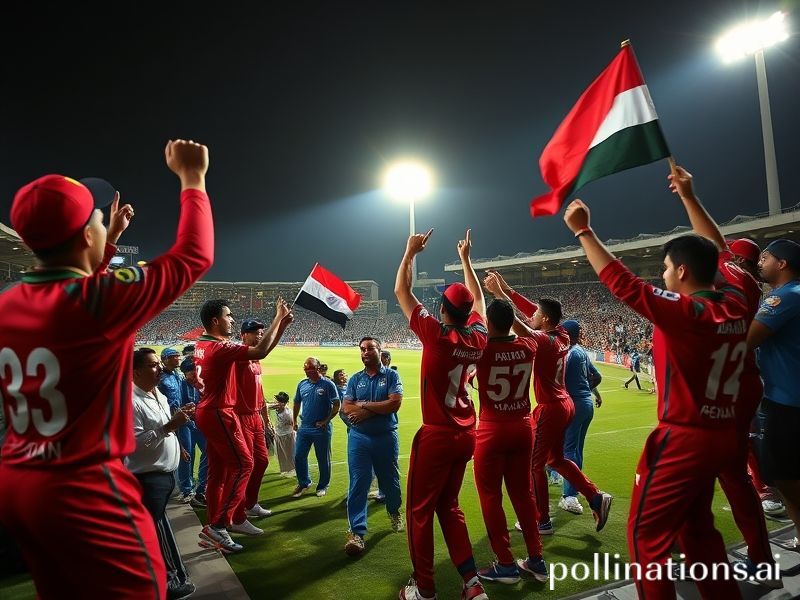Desert Derby: How Afghanistan vs UAE Became the 21st Century’s Bleakest Metaphor
Afghanistan vs UAE: Two Nations, One Desert, Infinite Irony
By Our Cynical Correspondent in the Sand-Swept Cheap Seats
Here we are again, watching two patches of sun-baked real estate pretend they’re playing the same sport. On one side, Afghanistan—freshly rebranded by its new management as “Talibanistan, Now With 30 % Less Music.” On the other, the United Arab Emirates, a country whose national bird is apparently the construction crane. What unites them? Sand, obviously. What divides them? Everything else, including who gets to sell the sand to China.
The world keeps score in oil rigs, cricket rankings, and Instagram followers. Afghanistan currently leads in only one category: global sympathy points, a currency that spends poorly at the IMF. The UAE, meanwhile, has diversified from pearls to petroleum to property portfolios so glossy you could use them to signal orbiting satellites. The Emiratis have even managed to make indoor skiing a thing, which is either visionary or the single best argument against evolution.
But let’s zoom out, because the match on the field—whether it’s cricket, geopolitics, or the more lucrative sport of lobbying Washington—matters less than the stadium we’re all seated in. That stadium is the 21st-century global order, and the popcorn is overpriced.
First, the refugees. Kabul’s fall 2.0 sent another wave of Afghans scrambling for exits. Many discovered that exit visas are like Bitcoin in 2022: theoretically valuable, practically elusive. The UAE, ever conscious of optics, airlifted a select few to Abu Dhabi, housed them in a converted hotel, and invited photographers to document the benevolence. Meanwhile, construction crews next door continued building islands shaped like palm trees for people who already own private islands. Somewhere, a PR intern earned hazard pay for keeping a straight face.
Second, the proxy scoreboard. Afghanistan remains the lab where every major power tests new drones, old grievances, and experimental nation-building techniques. The UAE, no longer content to be merely the Switzerland of the Gulf, now dispenses military advisers like party favors. If you listen closely, you can hear Russian, Chinese, and American generals whispering the same question in different accents: “Do you think they’ll notice if we just redraw the map again?” Spoiler: we won’t.
Third, the climate clock. Both countries are auditioning for the role of “uninhabitable by 2050.” Afghanistan’s glaciers—yes, they exist—are retreating faster than foreign correspondents after a kidnapping threat. The UAE’s response is to build bigger air-conditioners and commission another solar-powered city that looks suspiciously like a luxury doomsday cult. If irony were carbon, the atmosphere would already be opaque.
And then there’s the cricket. Nothing says “post-colonial trauma bonding” quite like a T20 match between a team whose home ground is literally exile and another whose sheikhs could buy the ICC if it ever threatened their tea breaks. When Afghanistan’s Rashid Khan spins a googly past some overpaid UAE import, the crowd erupts with the kind of joy normally reserved for visa approvals. For three hours, the scoreboard pretends history doesn’t matter. Afterward, everyone checks their phones to see if the banks are still open.
So what’s the broader significance? Simply this: the Afghanistan-UAE axis is a living, sunburned metaphor for the modern world. One country shows what happens when the international community loses interest; the other shows what happens when it invests too much, too cynically. Between them sits the rest of us, scrolling through headlines about solidarity summits and arms deals, wondering whether to laugh, cry, or update our LinkedIn profiles to “climate resilience consultant.”
In the end, the desert doesn’t care who plants which flag. Sand is famously apolitical. It just keeps blowing, indifferent to passports, pipelines, and power plays. And somewhere in that swirling dust, the next match is already scheduled—because nothing, absolutely nothing, stops the games we insist on playing.







